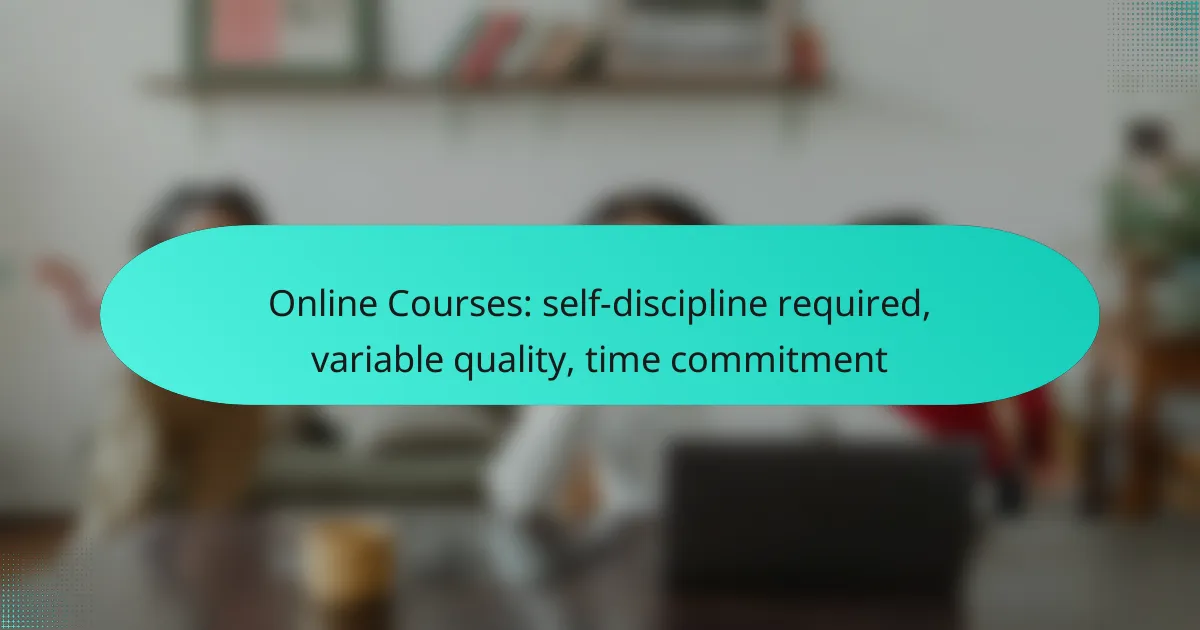Online courses can be a valuable resource for developing self-discipline, but they require a significant time commitment and careful evaluation of quality. Platforms like Coursera, Udemy, and edX provide structured content that encourages personal accountability, yet the effectiveness of each course can vary widely. To make the most of your learning experience, it’s essential to assess user reviews, instructor qualifications, and the expected time investment before enrolling.

What are the best online courses for self-discipline?
The best online courses for self-discipline focus on practical strategies and techniques to enhance personal accountability and time management. Courses from platforms like Coursera, Udemy, and edX offer structured content that helps learners develop the self-discipline necessary for achieving their goals.
Coursera: Self-Discipline Strategies
Coursera offers various courses that emphasize self-discipline strategies, often developed by leading universities. These courses typically include video lectures, quizzes, and peer-reviewed assignments to reinforce learning.
For example, a course might cover goal-setting techniques, habit formation, and the psychology behind self-control. Engaging with these materials can help you identify personal challenges and develop tailored strategies to overcome them.
Udemy: Time Management Techniques
Udemy features a wide range of courses focused on time management, which is closely linked to self-discipline. These courses often include practical tips and tools for prioritizing tasks and managing distractions effectively.
Many courses provide actionable frameworks, such as the Pomodoro Technique or Eisenhower Matrix, to help you allocate your time wisely. Look for courses with high ratings and reviews to ensure quality and relevance.
edX: Building Self-Discipline
edX offers courses specifically designed to build self-discipline through structured learning paths. These courses often combine theoretical insights with practical exercises that encourage self-reflection and personal growth.
Participants can expect to engage in activities that promote accountability, such as setting personal milestones and tracking progress. Selecting courses with interactive components can enhance your commitment to developing self-discipline.

How to evaluate the quality of online courses?
To evaluate the quality of online courses, consider factors such as user reviews, instructor qualifications, and course content. This assessment helps ensure that you invest your time and money in a course that meets your educational needs.
Check course reviews on Trustpilot
Trustpilot is a valuable resource for gauging the quality of online courses through user reviews. Look for courses with a high number of positive reviews, as this often indicates a reliable learning experience. Pay attention to recurring themes in the feedback, such as course content relevance and instructor engagement.
When reading reviews, consider the overall rating but also look for detailed comments that highlight specific strengths or weaknesses. A course with a solid rating but numerous complaints about poor support may not be worth your time.
Assess instructor credentials on LinkedIn
Checking an instructor’s credentials on LinkedIn can provide insight into their expertise and teaching experience. Look for qualifications such as relevant degrees, certifications, and professional experience in the subject area. An instructor with a strong background is more likely to deliver quality content and effective teaching methods.
Additionally, review any endorsements or recommendations from former students or colleagues. This feedback can help you gauge the instructor’s ability to communicate complex topics and engage learners effectively.

What is the typical time commitment for online courses?
The typical time commitment for online courses varies, but most programs require several weeks of engagement. Students should expect to allocate consistent hours each week to successfully complete the course material and assignments.
Average duration of 4-6 weeks
Most online courses are designed to be completed in an average duration of 4 to 6 weeks. This timeframe allows learners to absorb the material at a manageable pace while balancing other commitments. Some courses may offer accelerated options, while others could extend beyond this range depending on the subject matter.
When choosing a course, consider how the duration aligns with your personal schedule and learning goals. Shorter courses may provide quick insights, while longer ones could offer deeper exploration of complex topics.
Weekly time investment of 3-5 hours
Students typically need to invest about 3 to 5 hours each week to keep up with course requirements. This includes time spent on watching lectures, completing readings, and engaging in discussions or assignments. Understanding this commitment upfront can help you plan effectively.
To manage your time efficiently, create a weekly schedule that allocates specific blocks for course work. Avoid cramming by spreading out your study sessions, which can enhance retention and understanding of the material.

What factors affect self-discipline in online learning?
Self-discipline in online learning is influenced by various factors, including personal motivation and the learning environment. Understanding these elements can help learners develop better habits and improve their overall success in online courses.
Personal motivation levels
Personal motivation is a key driver of self-discipline in online learning. When learners are genuinely interested in the subject matter, they are more likely to stay committed and engaged. Setting clear goals and identifying personal reasons for taking a course can significantly enhance motivation.
To boost motivation, consider creating a vision board or a list of benefits that completing the course will bring. Regularly revisiting these reminders can help maintain focus and encourage persistence, especially during challenging times.
Learning environment distractions
The learning environment plays a crucial role in maintaining self-discipline. Distractions from family, social media, or even household chores can hinder concentration and reduce productivity. Establishing a dedicated study space can help minimize these interruptions.
To create an effective learning environment, try to eliminate potential distractions by setting boundaries with others and using tools like website blockers during study sessions. Additionally, scheduling specific times for learning can help establish a routine that reinforces discipline and focus.

How to improve self-discipline for online courses?
Improving self-discipline for online courses involves setting clear objectives and establishing routines. By focusing on specific goals and adhering to a structured schedule, learners can enhance their commitment and productivity.
Set specific learning goals
Setting specific learning goals helps to clarify what you want to achieve in your online courses. Instead of vague objectives like “I want to learn programming,” aim for precise targets such as “I will complete Module 1 of the Python course by the end of the week.” This clarity provides direction and motivation.
Consider breaking larger goals into smaller, manageable tasks. For example, if your goal is to finish a course in a month, outline weekly milestones that track your progress. This approach not only makes the learning process less overwhelming but also allows for regular assessment of your achievements.
Create a structured study schedule
A structured study schedule is essential for maintaining discipline in online learning. Designate specific days and times for studying, treating these sessions like important appointments. Consistency is key; try to study at the same time each day to build a routine.
Incorporate breaks and downtime into your schedule to prevent burnout. For instance, use the Pomodoro Technique, where you study for 25 minutes followed by a 5-minute break. This method can enhance focus and retention while keeping your motivation high.

What are the prerequisites for enrolling in online courses?
To enroll in online courses, you typically need basic computer skills and reliable internet access. These prerequisites ensure that you can navigate the course materials and participate in online activities effectively.
Basic computer skills
Having basic computer skills is essential for online courses. This includes familiarity with operating systems, file management, and using common software applications like word processors and spreadsheets.
Additionally, understanding how to navigate learning management systems (LMS) is crucial. Many courses use platforms like Moodle or Canvas, which require you to upload assignments, participate in discussions, and access resources.
Internet access
Reliable internet access is a fundamental requirement for online learning. A stable connection allows you to stream videos, download materials, and engage in live discussions without interruptions.
Consider the speed of your internet connection; a minimum of 5 Mbps is often recommended for smooth video playback. If you have limited access, downloading course materials for offline use can be a helpful strategy.

How do online courses compare to traditional education?
Online courses offer a more flexible learning experience than traditional education, allowing students to learn at their own pace. However, they often require a higher level of self-discipline and can vary significantly in quality.
Flexibility vs. structured environment
Online courses provide flexibility that traditional classrooms typically do not. Students can choose when and where to study, making it easier to fit education into busy schedules. This can be particularly beneficial for working professionals or those with family commitments.
However, this flexibility comes with the need for self-discipline. Without a structured environment, some learners may struggle to stay motivated and keep up with course materials. Setting a consistent study schedule and creating a dedicated study space can help maintain focus.
In contrast, traditional education often includes set class times and face-to-face interactions, which can enhance accountability. Students may find that the structured environment helps them stay engaged and committed to their studies.
